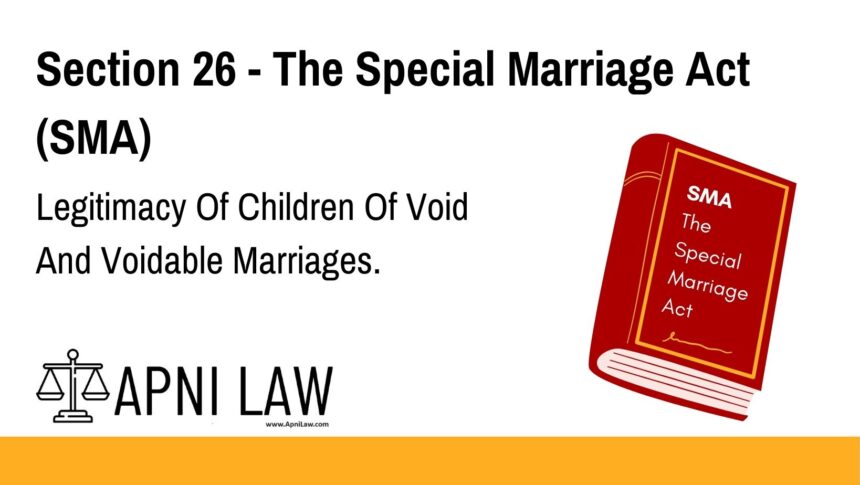Code: Section 26 of the Special Marriage Act, 1954
- Legitimacy of children of void and voidable marriages.—
(1) Notwithstanding that a marriage is null and void under section 24, any child of such marriage who would have been legitimate if the marriage had been valid, shall be legitimate, whether such child is born before or after the commencement of the Marriage Laws (Amendment) Act, 1976 (68 of 1976), and whether or not a decree of nullity is granted in respect of that marriage under this Act and whether or not the marriage is held to be void otherwise than on a petition under this Act.
(2) Where a decree of nullity is granted in respect of a voidable marriage under section 25, any child begotten or conceived before the decree is made, who would have been the legitimate child of the parties to the marriage if at the date of the decree it had been dissolved instead of being annulled, shall be deemed to be their legitimate child notwithstanding the decree of nullity.
(3) Nothing contained in sub-section (1) or sub-section (2) shall be construed as conferring upon any child of a marriage which is null and void or which is annulled by a decree of nullity under section 25, any rights in or to the property of any person, other than the parents, in any case where, but for the passing of this Act, such child would have been incapable of possessing or acquiring any such rights by reason of not being the legitimate child of his parents.
Explanation of Section 26 – Legitimacy of Children from Invalid Marriages
Section 26 of the Special Marriage Act, 1954 safeguards the rights of children born from marriages that are later declared void (under Section 24) or voidable (under Section 25). The intent of this section is to ensure that children do not suffer due to the legal status of their parents’ marriage.
Key Provisions:
- Children born from void marriages (under Section 24) or voidable marriages (under Section 25) are considered legitimate.
- The legitimacy applies whether the marriage is declared null or not.
- Legitimacy is ensured regardless of whether the child was born before or after the 1976 Amendment to the law.
- However, such children cannot claim inheritance rights from anyone other than their biological parents.
Illustration
Example 1: Child from Void Marriage
A couple marries under the Special Marriage Act, but the marriage is later declared void because one party was already married (a violation of Section 4(a)). A child born from that marriage is still considered legitimate under Section 26(1), even if no formal nullity decree is passed.
Example 2: Child from Voidable Marriage
A marriage is annulled due to fraud under Section 25. A child conceived before the decree of nullity is still treated as legitimate under Section 26(2), even though the marriage is later declared voidable.
Example 3: No Inheritance from Third Parties
Although a child from a void or voidable marriage is deemed legitimate, Section 26(3) clarifies that such a child has no right to inherit property from anyone other than their biological parents. For example, the child cannot claim ancestral property from uncles or grandparents unless otherwise entitled by a valid will.
Common Questions and Answers on Section 26 SMA
1. Are children from a void or voidable marriage considered legitimate?
Yes. Section 26 ensures that such children are legally recognized as legitimate, regardless of the status of their parents’ marriage.
2. Does the legitimacy depend on whether a court decree is passed?
No. The legitimacy applies whether or not the court passes a decree of nullity, and even if the marriage is void otherwise than under this Act.
3. Can such children inherit ancestral property?
No. Section 26(3) clearly states that they cannot inherit property from anyone other than their parents unless explicitly mentioned in a valid will or through another lawful mechanism.
4. What if the child was born before the 1976 Amendment?
The section applies retroactively. Children born before or after the Marriage Laws (Amendment) Act, 1976 are protected under this provision.
5. Is legitimacy affected if the marriage is annulled after the child is born?
No. Even if the marriage is later declared void or annulled, the child’s legal status as legitimate remains unaffected.
Conclusion
Section 26 of the Special Marriage Act protects the rights and status of children born from void or voidable marriages. While it grants legitimacy, it also draws a clear boundary by not extending inheritance rights beyond the parents. This provision upholds social justice and child welfare, ensuring children are not punished for their parents’ marital status.
Looking for more guidance on family law and child legitimacy? Explore detailed resources and expert legal help at 👉 ApniLaw.








